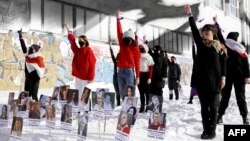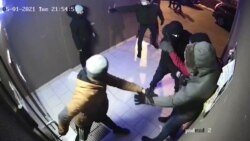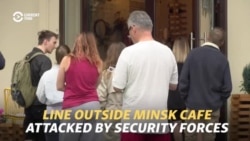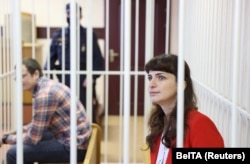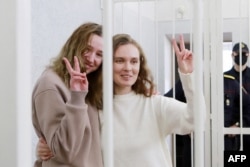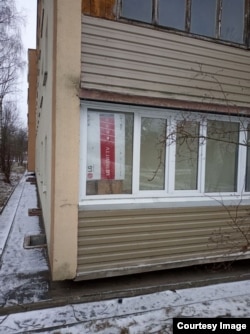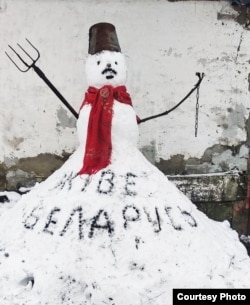Get detained for going Nordic walking; face prosecution for building a snowman, or for “mentally supporting the protests.” These are some of the situations that have become Belarus’ new normal since protests began against official results of the Eastern European country’s disputed August 9, 2020 presidential election that declared Alyaksandr Lukashenka the winner.
As of January 2021, over 33,000 people had been detained in connection with the protests, the Belarusian human rights organization Viasna (Spring) estimated. According to Viasna’s calculations, the country now contains 252 political prisoners.
Roughly a month after the unauthorized protests’ start, Lukashenka, who had ruled the country since 1994, urged the prosecutor general’s office not to go against the law in stopping these demonstrations – events that he termed an outside attempt to stir up a revolution. But, he noted, “sometimes there is no time for the law.”
We selected 14 confirmed situations that highlight how that observation has played out in practice.
1. You Can Be Prosecuted For Your Thoughts
In Belarus, merely “mentally supporting” protesters against the official results of the 2020 presidential election can lead to detention. That’s what happened to 27-year-old Kirill Dolgorukov from Minsk, independent news outlet TUT.by reported.
Police detained Dolgorukov on November 29, 2020 during a round-up of suspected attendees at an unauthorized rally near his residence. Dolgorukov, a physical-education teacher, objected that he had just stepped out for groceries.
At his court hearing a day later, Dolgorukov elaborated that, though he hadn’t attended the rally, he did “mentally support” the protesters.
He alleged to TUT.by that the judge, Anastasia Leykovskaya, concluded "You’re guilty, then.” Leykovskaya sentenced Dolgorukov to 13 days in jail for violating “the established procedure” (receiving official permission) for large-scale public events (Article 23.34 of Belarus’ Code of Administrative Offenses).
Dolgorukov appealed the ruling, but the status of his appeal is unclear.
Belarusian human-rights activists have set up a website to document abuses of Article 23.34, which has been frequently used to detain, arrest, and fine Belarusian protesters since the August 9, 2020 presidential vote.
2. Unknown, Masked Men Can Detain And Beat At Will
At first glance, it can look like an abduction or robbery; even a gang’s turf battle. But these are Belarus’ tsikhary or “silent men;” masked thugs who round up detainees, beat protesters, or chase after police suspects. Often, they are believed to be plainclothes police. Rights activists consider them a way for the police to flex their muscles without being held accountable.
WATCH: Plainclothes Security Forces Round Up Minsk Residents
Government critics charge that the November 12, 2020 death of Minsk resident Raman Bandarenka is a prime example of these individuals’ activities. Video footage was shot of a group of masked men in civilian clothes assaulting and then abducting Bandarenka after he challenged their destruction of red-and-white Belarusian flags near his apartment building. He later died in a city hospital from what was reported to be severe head trauma.
Prosecutors and police initially alleged that Bandarenka had been drunk and disorderly at the time of the incident.
On February 18, however, prosecutors opened a criminal investigation into Bandarenka’s death from injuries stemming from an intentional beating. The charge carries a potential prison sentence of between 5 and 15 years.
The Prosecutor General’s Office added that nothing has established that police took part in the beating that led to Bandarenka’s death.
Yet, though the tsikhary wear no identification, their links with the police are often relatively plain, however.
In September, the tsikhary’s actions gained international attention when, in conjunction with a senior police officer, they broke the windows and glass door of a Minsk café in pursuit of alleged participants in an unauthorized demonstration against the official election results.
Commented one café employee to Current Time, “Everyone knows who they were.”
3. You Can Be Charged For Reporting On Or Testifying About A Suspected Murder
After Bandarenka's death, TUT.by journalist Katsyaryna Barysevich and emergency-room physician Artyom Sorokin, who treated the young man in a Minsk hospital, were detained on criminal charges for “disclosing protected patient information that led to severe consequences.” Their trial started on February 19.
For now, the only “severe consequence” appears to be that the information the two publicly provided contradicted a televised statement by Alyaksandr Lukashenka that Bandarenka had been intoxicated.
Dr. Sorokin disclosed that Bandarenka did not have any alcohol in his blood on the night of his death. Barysevich published a medical document that also established that fact.
Amnesty International has recognized the two, now on trial, as prisoners of conscience. The government does not appear to have responded to that categorization.
4. Live-Streaming A Rally Can Land You In Jail
It might seem like a routine assignment. But satellite television outlet Belsat’s November 15,2020 livestream of an unauthorized street commemoration for deceased Minsk resident Raman Bandarenka led to two-year prison sentences for the two journalists, Katsyaryna Andreyeva (Bakhvalava) and Daria Chultsova, providing the coverage.
Charged with supposedly “organizing public events aimed at disrupting civil order,” the women have since been recognized as political prisoners.
Their prison terms, along with police searches of journalists and human-rights activists, prompted the United States on February 18 to ban visas to the U.S. for 43 Belarusian officials, judges, and academic administrators who have violated Belarusians’ civil rights. The United Kingdom has taken similar measures against 27 individuals.
But what consequence such penalties will have is unclear. One of those targeted by the U.K., state-run Beltelradio boss Ivan Eisemont, charged that Western officials “live in a parallel, abnormal reality.”
5. You Could Lose Custody Of Your Children If They Attend Protests
Other than detentions, Belarus appears to be using child custody rights as a potential check on protests.
In September 2020, the official overseeing compliance with child-welfare laws for the Prosecutor General’s Office, Alyaksey Podvoiski, warned in an interview on the state-run Capital Television channel that prosecutors have the right to take children under 16 away from their parents if the parents do not protect their offspring’s safety by keeping them away from unauthorized demonstrations.
By October 13, 2020, Podvoiski acknowledged that such instances had occurred. He did not provide a total number of cases.
Affected parents undergo “rehabilitation” before their children are returned to them, he added. Podvoiski and other officials have not provided further details to media.
Belarus is not alone in targeting parental rights in this way. Ally Russia attempted the same in the summer of 2019, when Moscow prosecutors petitioned to take away the children of two couples who had been filmed with their offspring at unauthorized protests. Courts eventually rejected prosecutors’ cases.
In Belarus, though hundreds of parents allegedly have been warned, adolescent and younger Belarusians continue to be seen at demonstrations against the 2020 elections’ official results.
There’s also a chance that they could get detained with their parents and spend a few hours in a police station.
Such crackdowns have influenced the games many children play. Photos and videos from around Belarus show youngsters mimicking police detentions and clashes with protesters. Kindergarteners have been filmed shouting the “Long live Belarus!” protest slogan, while other children draw protesters with Belarus’ red-and-white tricolor flag.
Children in the northeastern Belarusian city of Vitebsk pretend to be detained.
6. A Brutal Form Of Hide-And-Seek
When helmeted or plainclothes police start chasing suspected protesters, Belarusians sometimes have hidden in basements or taken refuge in the apartments of strangers. That tactic does not always work, however.
Under the Belarusian Criminal Code, law enforcement officers are authorized to enter a private residence without a warrant if they are chasing a wanted individual hiding from the police or suspect that some criminal activity is taking place inside. To the police, though, all participants in unauthorized street demonstrations appear to be seen as “wanted.”
Violence can often ensue, as depicted in one case, when jeans-clad police wearing black helmets with visors burst into a Minsk apartment on October 25, 2020 and harshly dragged out suspected protesters.
Warning: Some viewers may find the footage below disturbing.
Police are supposed to inform the prosecutor general’s office within 24 hours of the search, but the extent to which that practice is followed is unclear.
A line-up of detainees in a police raid on a Minsk apartment building
7. No Candy Canes Allowed
The Belarusian government does not tolerate any public display of white and red – even if it’s food. The colors hearken back to Belarus’ former flag, a symbol of the protest movement against Lukashenka that officials see as a threat to the state.
One representative of the Resttrade hospitality-industry supplier apparently took that perception to heart. In a late 2020 letter, widely circulated on social media, the individual, identified only as Tamara Mikhailovna, warned staff to make sure that any fruit jam sold did not combine white and red.
An executive from Resttrade’s Dionis grocery-store chain later commented to Onliner.by that this was the employee’s “personal point of view.” The company itself “serves all buyers, regardless of their political views,” wrote Marketing Director Natalia Koltovich.
In part, the Resttrade employee’s concern might have been prompted by the case of 75-year-old opposition supporter Iraida Miska. In late October 2020, a judge in Zhodzina, about an hour outside of Minsk, fined Miska 540 Belarusian rubles (about $205) for supposedly “demonstrating” with a white-and-red marshmallow traditionally found throughout Belarus. A photo of her holding such a marshmallow during an unauthorized election protest had surfaced online.
“That’s how she protests – with a marshmallow,” police officer Yauhen Semashka, a witness for the prosecution, claimed at one of Miska’s hearings, Ex-Press.by reported.
For good measure, under separate charges, police later searched the elderly woman’s apartment and confiscated a computer as well, according to the outlet.
8. Belarusian Flags In Cold Storage
Aside from fines, displaying Belarus’ traditional red-and-white flag can lead to someone throwing a rock through your window or the police paying a call. With the advent of winter, however, some opposition supporters hit on a way around these obstacles.
They have placed the banned flags in rivers, lakes, and canals, so that when the water freezes over in winter, municipal workers must laboriously chip them out from under the ice. In at least one instance, when the crew could not remove a flag, they simply dumped sand over it.
Watch: How The Struggle Over Belarus' Symbols Has Taken To The Ice
To get around these restrictions, other Belarusians have hung flattened, red-and-white LG television boxes in their windows. Or displayed red and why laundry on clotheslines.
One villager in the northern region of Polatsk received 7 days in jail for supposedly staging an unauthorized public event when he painted a band of white and red around his otherwise blue house.
But officials may be ready to up the ante: Belarus’ Prosecutor General’s Office is now considering designating the flag an “extremist symbol” and imposing a maximum 10-year prison sentence for its display.
Whether this designation would also apply to red-and-white marshmallows, LG television boxes, and laundry is unclear.
9. Giving A Tour Of Minsk’s Historic Sites Can Get You Arrested
After six months of unauthorized street protests at Belarus’ official 2020 presidential election results, apparently, any group of people in downtown Minsk can now spark police suspicions – even if they are tourists.
On January 31, certified tour guide Oksana Mankevich was detained with seven participants in her free tour of points of interest between Minsk’s Liberty Square and Independence Square.
The group was detained 15 minutes after the conclusion of an announced “rehearsal” for an opposition march in this location.
Along with one of the tourists, Mankevich was sentenced to 15 days in jail for supposedly participating in a public event that city officials had not authorized. She was fined 870 Belarusian rubles ($337.66).
Mankevich denied the charges, and stressed that no regulation requires the city’s permission to conduct a tour.
10. Snowmen Need Permission To Protest
In Belarus, you can now be prosecuted for building a snowman if it wears something red. The red-and-white contrast evokes Belarus’ former flag, now a protest symbol for which police have no tolerance. (See #5 and #6.) Writing the popular protest slogan “Long Live Belarus!” on the snowman itself is seen as similarly inflammatory.
Syarhey Kachalau, 62, learned this the hard way on January 14, when a court in the southeastern city of Homel heard a police case against him for supposedly using a snowman with a red scarf to stage an unauthorized “solo protest.”
Kachalau objected that he had never taken part in a demonstration; he’d just built a snowman in his courtyard. He had added “Long live Belarus” because he wants the country “to flourish,” he said.
“I don't think I wrote anything so terrible. I didn’t write ‘Don’t live long, Belarus,’” he noted in court, TUT.by reported.
The court sent the case back to the prosecution to rework since how exactly the snowman had staged his solo protest was unclear.
Belarus has no exact legal precedent for this case. If it holds up in court, Kachalau might face a fine. In 2019, a woman from Brest was fined 25.5 Belarusian rubles (about $12) for staging “a mass event” after building a snowman with a sign protesting the construction of a factory.
11. Nordic Walking Can Land You In Jail
They say they just wanted to lose weight. But their Nordic-walking class led to them losing their liberty, instead.
Six women in Belarus’ northeastern Vitebsk region were detained on January 13 after gathering in a forest for what they described as a fitness master class. The police, however, allege that the get-together was an unauthorized demonstration that featured Belarus’ banned former flag, the red-and-white tricolor that symbolizes opposition to Alyaksandr Lukashenka’s official reelection as president.
“We didn’t even talk about politics,” objected one of the detained, Alena Kosnova, the Belarusian news portal TUT.by reported. “My only goal was to lose weight.”
After the scoop-up by 12 police officers, one woman was taken to the hospital, another released, and the rest spent a day in prison waiting for their court hearing.
In an unusual move, two Vitebsk judges dismissed the case on January 19 for lack of proof of wrongdoing. A few weeks later, that decision was upheld by a regional court over prosecutors’ objections.
Other defendants have had less luck. Dancing with friends in the woods on December 25, 2020 landed one 59-year-old woman from Homel in prison for a week. The authorities considered the gathering she had attended an unauthorized demonstration since some participants had carried the banned red-and-white Belarusian flag.
For good measure, police even searched the woman’s house. Two other participants in the forest dance party were also detained.
12. Honking Your Car’s Horn Can Cost You Your License
While inappropriate honking is illegal in many places, in Belarus it can land you in real trouble if it's considered political.
Since August 2020, numerous dissenting drivers have been punished by fines or the loss or year-long suspension of their driver’s licenses for any honk considered critical of the government or supportive of protesters.
In February 2021, two Minsk drivers were stopped by police after honking in disapproval at a bus carrying pro-Lukashenka activists to a government-sponsored forum. They now face fines of up to 290 Belarusian rubles (about $112) as well as the restrictions on their licenses cited above.
13. The Police May Need Your Help To Incarcerate You
Sentenced in absentia to a week in prison in December 2020 for covering an unauthorized memorial rally for the slain Raman Bandarenka, Minsk photographer Aleksandra Filipovich-Sushchyts opted to turn herself in. But there was just one problem – the Minsk police station had no vehicle available to take her to jail.
Waiting could have taken hours. Or required a ride in a taxi or public shuttle bus. Instead, the photographer’s father drove both Filipovich-Sushchyts and the arresting officer to the prison.
A photographer for the news site Nasha Niva (Our Field), Filipovich-Sushchyts earlier had been denied an appeal for her sentence.
Photographer Aleksandra Filipovich-Sushchyts shown entering prison in Minsk
14. Even If Dead Or Departed, You Can Be Summoned To Court
In September 2020, Alyaksandr Voitukevich from western Belarus’ Lida region learned that his mother had been charged for taking part in an unauthorized protest rally, a human-rights lawyer told Gazetaby.com. The news was a surprise: Voitukevich’s mother had died in 2014. The judge reportedly apologized.
A similar summons made its way to Maya Korsik, a Russian citizen who lives in Australia, RFE/RL’s Belarusian Service reported. Korsik, who lived in Belarus until 2015, said that she had last visited the country in 2017. She had restricted her protesting against Belarus’ official presidential election results to Australia and social media.
Korsik’s case was eventually closed.
Editor's Note: Through a production error, this text originally contained two contradictory statements that have been corrected: A criminal investigation has been opened into the death of Minsk resident Raman Bandarenka. Belarus' red-and-white tricolor flag is not banned by law, though it is often treated as such by law enforcement.
Separately, in one instance, journalist Katsyaryna Barysevich's first name was spelled with its Russian spelling. It has been changed to its Belarusian spelling.




